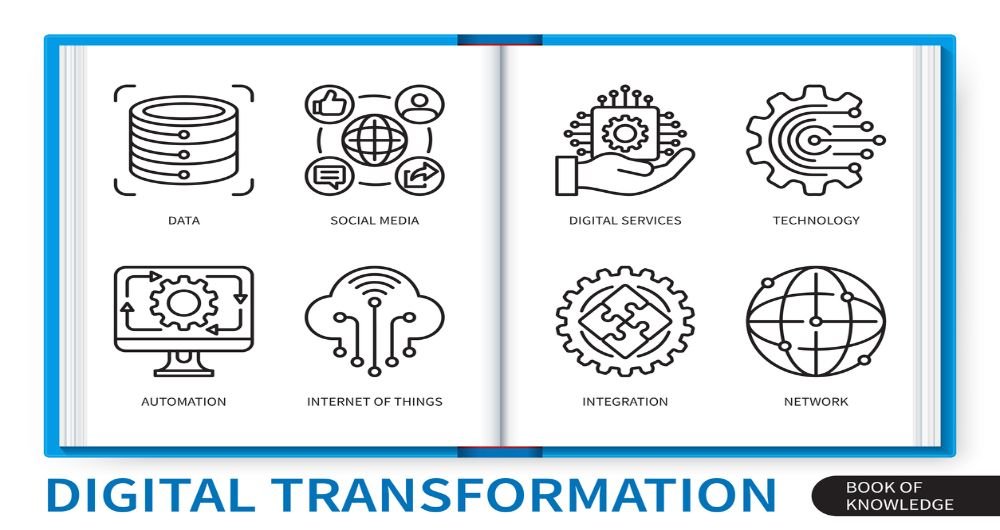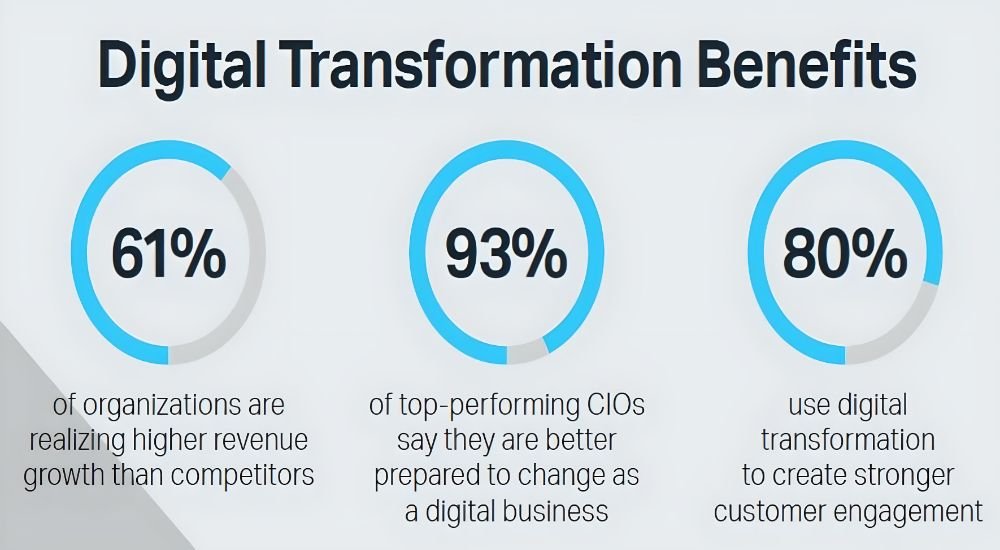11 Benefits of Digital Transformation: A Game-Changing Guide
Digital transformation is a buzzword that has been around for a while, but what exactly does it mean for businesses? Simply, it refers to integrating digital technology into all business areas. The benefits have revolutionized businesses ‘ operations, from customer engagement to data analysis and operations management.
This blog post will delve deeper into those benefits of digital transformation for businesses and reveal its 11 advantages.
Finally, we will discuss the future of digital transformation and how your business can start its journey toward it by incorporating best practices. So buckle up and learn how it can benefit your business in more ways than one.

Understanding Digital Transformation
Embrace the digital era with effective business strategies and unlock new growth opportunities through digital technologies. Stay ahead of the competition by adopting digital solutions leveraging automation and AI for improved business processes. Drive agility and decision-making with data-based insights.
Defining Digital Transformation
Digital transformation refers to the holistic integration of digital technologies into all aspects of a business. It goes beyond implementing new tools and requires a fundamental change in mindset and culture. Successful transformation involves adapting to customers’ changing needs and expectations in the digital age, encompassing people, processes, and technology.
This transformation improves future growth and gives you the potential to bring together different parts of the organization to achieve something great for the entire organization.
The Role of Digital Technologies
Digital technologies enable a shift toward digitalization, providing a foundation for innovation and exploring new revenue streams. AI and IoT revolutionize industries and drive initiatives. Social media and analytics are crucial in understanding customer behavior and market trends. Digital tools empower employees and enhance collaboration within the organization.
The Impact on Business Operations
Digital transformation significantly impacts business operations. It reduces inefficiencies and replaces manual data entry with streamlined digital workflows. Supply chain management becomes more efficient with real-time visibility and automation. A connected digital platform enhances communication and collaboration.
The Importance of Digital Transformation for Businesses
Digital transformation is vital for businesses to remain competitive. It is critical to adapting to market trends and customer demands through digital technologies is crucial. It enhances customer experience, drives business growth, and enables data-driven decision-making. Embracing transformation is an initial act towards a successful business strategy in the digital world.
Keeping Up with Market Trends
Staying ahead of market trends and customer preferences is crucial for businesses, and digital transformation helps achieve that. By embracing new technologies and digital solutions, organizations gain a competitive edge, meet changing market demands, ensure sustainability, and safeguard their market share.
Staying Competitive in the Industry
In today’s fast-paced business landscape, staying competitive is crucial. By embracing digital transformation, businesses can offer innovative products and services, respond quickly to market changes and customer demands, enhance agility and adaptability, and gain a competitive advantage by effectively leveraging digital tools and processes.
Enhancing Customer Experience
Digital changes can enhance customer experience by facilitating personalized interactions and meeting customer demands for seamless experiences. Businesses can utilize customer data to tailor their products and services, while digital solutions like mobile apps and self-service portals provide convenience. Real-time support and personalized customer service are also made possible.

Source: Opentext Microfocus
Revealing the 11 Benefits of Digital Transformation
I have compiled a list of excellent advantages of using the benefits of digital transformation. Let’s delve into them together.
1. Improved Efficiency and Productivity
Digital transformation results in streamlined processes and automation, boosting efficiency and productivity. Businesses gain real-time data for faster decision-making. Collaboration and communication improve within teams and with customers. Personalized interactions and accessibility enhance the customer experience. Those transformations enable businesses to stay competitive and adapt to market trends.
2. Enhanced Customer Engagement
Digital transformation enables businesses to improve decision-making and operational efficiency through data analysis. By adopting digital tools, companies can provide personalized experiences and efficient communication channels, enhancing customer engagement and experience improvement.
Automation and streamlined processes, such as eliminating manual processes, lead to cost savings and increased revenue, making it especially beneficial for enterprise businesses with an average of 900 apps. Agility and adaptability enable companies to stay competitive. Innovation and collaboration drive growth and development within the organization.
3. Streamlined Operations and Better Agility
Improved efficiency and productivity are achieved through process automation, while collaboration and communication between departments are enhanced. Costs are reduced by eliminating manual tasks and paperwork. This allows for greater agility for businesses to adapt to market demands. Personalized digital interactions improve customer experiences.
4. Better Data Analytics and Decision-Making
Digital transformation allows businesses to streamline operations, enhance communication and collaboration, and stay competitive by adapting to changing customer needs and market trends. With digital technologies, companies can gather and analyze data more efficiently, leading to better decision-making and improved performance.
5. Increased Innovation
Digital transformation drives efficiency and productivity, keeping businesses competitive in a rapidly changing landscape. It enhances customer experience and engagement while enabling new business models and revenue streams. By unlocking growth opportunities, digital transformation fosters innovation and empowers organizations to adapt their business strategy.
6. Greater Market Penetration and Competitiveness
Digital transformation enables businesses to reach new markets and expand their customer base through digital channels and tools. It improves customer engagement, loyalty, and overall efficiency and productivity. Improved data management and analysis lead to valuable insights that drive business growth. Moving towards a digital business model provides a competitive advantage in the marketplace, including enhanced security to protect against potential data breaches.
7. Scalability of Business
A digital footprint allows businesses to easily scale up or down, respond quickly to changes in demand, and seize new opportunities. Cloud-based technologies provide on-demand resources, while digital tools automate processes and increase efficiency. Scalability improves profitability by optimizing operations without outgrowing capabilities.
8. Employee Empowerment
Digital transformation empowers employees by playing a pivotal role in giving them real-time data and insights. Automation of tasks frees up their time, allowing them to focus on more meaningful work.
Remote work and collaboration tools improve work-life balance, while enhanced communication channels facilitate collaboration and knowledge sharing among team members. Upskilling and reskilling programs help employees stay competitive in a rapidly changing digital landscape.
9. Cost Savings
Digital transformation can result in significant cost savings by optimizing processes, reducing manual labor, and automating routine tasks. It can also help streamline the supply chain, cut down on operational costs, and provide better insights for financial decision-making.
Cloud-based solutions further reduce costs by eliminating hardware and maintenance expenses. Companies worldwide spent almost $1.6 trillion on digital transformation efforts in 2021, and spending is increasing annually.
10. Risk Mitigation
Through improved data analytics and monitoring, transformation in the digital realm helps businesses identify and address risks in real-time. Automation reduces the chance of human error, while regular updates and cybersecurity measures mitigate risk. This leads to increased trust from customers and stakeholders.
11. Sustainability of Business Practices
Digital transformation fosters sustainability in business by reducing paper usage and waste. Energy-efficient technology minimizes environmental impact and saves costs. Cloud-based solutions enable remote work, reducing commuting and office space requirements. Sustainability also enhances brand image and attracts environmentally conscious customers. Implementation of sustainable practices contributes to long-term cost savings and increased ROI.
How Can Your Business Benefit from Digital Transformation?
Digital transformation can help your business by providing new ways to make money. You can use digital technology to improve how customers think about you and to offer new products and services. Automation and AI can help you work more efficiently, and investing in the right automation tools can significantly benefit your business.
By embracing this change, you’ll be able to stay ahead of the competition and take advantage of the Internet of Things. You can also use data to make better decisions that lead to business growth and higher profits.
Identifying Areas for Digital Transformation
To identify change areas, evaluate business processes, and assess the impact of digital technologies on customer service and retention. Analyze data management, supply chain processes, and opportunities for enhanced decision-making and analytics. Explore the role of social media metrics in improving visibility and market share.
Implementing Digital Transformation Strategies
To successfully implement digital transformation strategies, you can:
- Develop a clear business strategy aligned with your goals.
- Invest in the right tools and technologies to support digital initiatives.
- Foster a digital culture within your organization to drive adoption and innovation.
- Streamline workflows and eliminate manual data entry through digital processes to enhance efficiency.
- Collaborate across internal departments to ensure a holistic transformation journey.
Measuring the Success of Digital Transformation
After Digitization:
- Defining key metrics accurately and reflecting their impact is vital to measuring success.
- Monitoring customer satisfaction and retention rates can serve as indicators of success.
- Tracking operational efficiency cost savings improvements and analyzing the integration and effectiveness of digital tools and processes.
- Evaluating overall business growth and market share provides a comprehensive view of its success.
What Will Be the Next Big Thing in Digital Transformation?
Discover emerging trends in digital transformation, such as IoT and analytics. Data collection and management are crucial for success. Analyze the impact of AI and machine learning on digital strategies. Leverage the power of the internet and connectivity to stay ahead of competitors with an effective long-term strategy.
How Can You Start Your Digital Transformation Journey?
To start your digital transformation journey, you can:
- Assess your current digital capabilities and identify areas for improvement
- Clearly define your business goals and objectives for the transformation.
- Develop a roadmap and timeline for implementing digital initiatives
- Seek guidance from experts and consultants to navigate through the process
- Continuously evaluate and adapt your strategy for long-term success

What are the long-term benefits of digital transformation?
Long-term benefits of digital transformation include increased efficiency and productivity in business operations, better customer engagement, improved customer experience, and the ability to stay competitive in a rapidly changing market. Additionally, it can lead to cost savings through automation and streamlined processes.
Final Thoughts
Digital transformation is no longer an option for businesses; it is a necessity. The benefits of embracing it are vast and can profoundly impact your business’s success. The advantages are undeniable, from improved efficiency and productivity to enhanced customer engagement and better data analysis. It allows you to keep up with market trends, stay competitive, and scale your business effectively with the help of digital transformation initiatives.
With the potential for increased ROI and many other digital transformation benefits, implementing a DX program is a game-changing move for any organization. By empowering your employees and implementing sustainable practices, you can future-proof your business and ensure its long-term success.
To learn more about how digital transformation can benefit your business, check out our “7 Top Digital Transformation Tools” post and start your journey towards a digitally transformed future.
